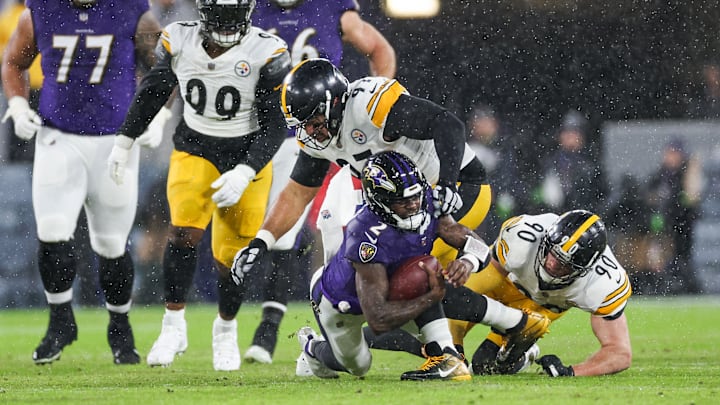The Tennessee Titans have to find a way to get more pressure on opposing quarterbacks, and the answer is staring them right in the face. Their defense is built around the idea of attacking the quarterback with blitzes, but they need to employ that strategy more often.
One of the first things new Titans defensive coordinator Dennard Wilson talked about during his introductory press conference was the influence that Gregg Williams and Todd Bowles had on his mindset. Both of those coaches made careers out of blitzing opposing quarterbacks early and often.
With that in mind, general manager Ran Carthon built a defense to accommodate that mentality. The Titans invested in cornerbacks that could cover in one-on-one situations with L'Jarius Sneed and Chidobe Awuzie.
Then they drafted T'Vondre Sweat and put him next to Jeffery Simmons. The thought process was that the defensive tackles would wreak havoc unless both of them were double-teamed.
With defensive backs who can cover, and a defensive tackle tandem that demands double-teams, veteran acquisitions like Ernest Jones IV, Jamal Adams, and Kenneth Murray would be in perfect positions to attack the quarterback.
The Titans corners are doing a solid job covering and the defensive tackles are eating up blockers, but Wilson has to start pulling the trigger on more blitzes. While the Titans are blitzing at the 12th-highest rate in the NFL, that simply isn't enough, given their ineffectiveness at getting home when simply rushing four.
Outside of Harold Landry, the Titans don't have a single EDGE on the roster with a chance at double-digit sacks. If the Titans don't blitz, then eventually the coverage will break down because even the greatest cornerbacks can't cover forever.
Case in point, Pro Football Reference says that the Titans have the sixth-worst pressure rate in the NFL.
#Titans' defense is 26th in pass pressure percentage at 16.5 %, per @pfref.
— Paul Kuharsky (@PaulKuharskyNFL) September 25, 2024
Giving Wilson the benefit of the doubt, the plan in Week 1 was to confuse Caleb Williams with coverage and different pressures without sending too many blitzes. It made sense to force him to read defenses instead of giving him a chance to get away from pressure and find Keenan Allen, Rome Odunze, or D.J. Moore one-on-one down the field.
The Titans probably didn't blitz Aaron Rodgers more in Week 2 because he's one of the greatest quarterbacks of all time at identifying pre-snap and getting the ball out quickly to his pass catchers.
Week 3 was a nightmare for everyone involved. The Titans defense couldn't adjust to what they were seeing from Malik Willis until the second half, and by then it was already too late.
There are no excuses this week. The rumor is that Tyler Huntley is going to be the starting quarterback for the Miami Dolphins this weekend. Skylar Thompson is hurt and the only other option is Tim Boyle, who has thrown four touchdowns and 12 interceptions in his NFL career.
Whether he's the starter or not, Huntley is the guy the Titans should be game-planning for. When they do that, they should see that he is exactly the kind of quarterback that you want to blitz early and often.
Huntley hasn't started a meaningful game for a team since 2022. That season, the Baltimore Ravens tried to hide him with run-heavy game plans. According to PFF, when he did pass, there was a dropoff when he was blitzed.
When blitzed: 1 touchdown, 2 interceptions, 5 sacks (17.9% of pressures turned to sacks)
When not blitzed: 3 touchdowns, 2 interceptions, 4 sacks (13.3% of pressures turned to sacks)
When Huntley was blitzed, the numbers show that he tended to scramble out of the pocket quicker and his average depth of target lowered by 28%.
To sum it up, if you blitz Huntley he throws the ball shorter, gets sacked more often, throws fewer touchdowns, and throws interceptions at a higher rate. Wilson has no excuse not to rain fire down on Huntley early and often.
